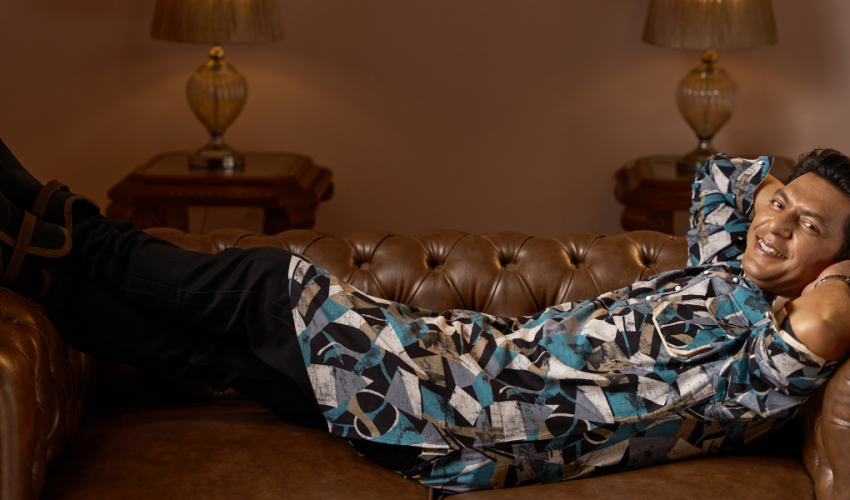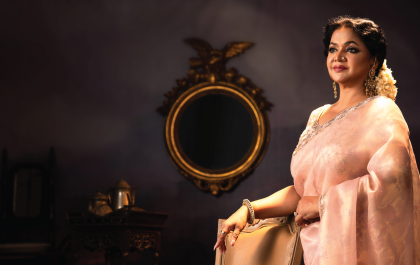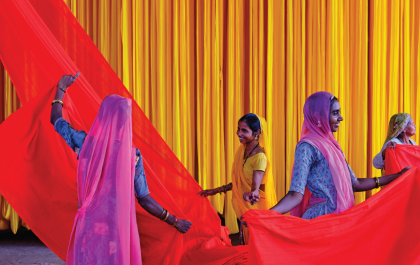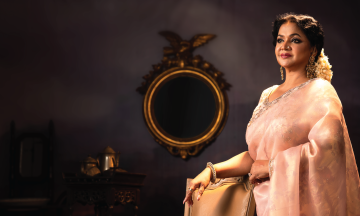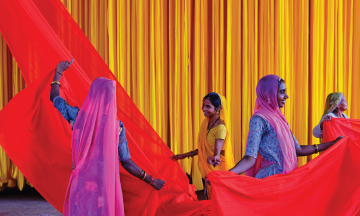By Zareen Nawar
The inimitable Chanchal Chowdhury is a human chameleon
From commencing his work in the industry with music, props, and costumes to finding his place as an actor, Chanchal Chowdhury knew he wanted to, at the minimum, be a part of the world of entertainment. The two-time National Award-winning actor might not have dreamt of being an actor from the outset, but his body of work created for him an indelible space in the industry. His next biopic Padatik with director Srijit Mukherji will allow fans to see him depict the more important aspects of the life of the illustrious director Mrinal Sen. According to Chanchal Chowdhury, the intelligent Srijit Mukherjee supported him with directions while he tried to support Srijit Mukherjee with his acting to highlight the more notable achievements of the late Mrinal Sen.
“And the rest will be decided by the audience,” the articulate actor added when he had a chat with MWB over the phone to further talk about his life.
Growing up in a society that favors more ‘stable’ careers like medicine or engineering, how hard was it to push past the social pressures and follow your dreams?
I studied science under both the SSC and HSC curriculums and my parents hoped that I would grow up to become a doctor or maybe an engineer, but I never found myself being pulled in that direction. I had an older brother-in-law who passed away 10 years ago, and he had a special standing after my father as most of our family members listened to him. When I got into the Department of Fine Arts at the University of Dhaka, he played an integral part in convincing most of my family members to be okay with my decision. He was progressive, and he was also invested in the creation and advancement of art and culture.
Could you share some experiences from your early theater day? What was the hardest lesson to learn in theater?
Creative works have endless wisdom so there is no end to learning. The audience or consumers change over time so it becomes a requirement for creative works to evolve with them thus the ways of learning have no end. Acting on stage in particular requires preparation periods since it becomes impossible to act on stage immediately after joining the theater […] One needs to work hard and pay attention to the organization of plays alongside the team members too. The entire culture is an ongoing process where learning never ceases.
How has theater culture evolved, in your opinion?
Aside from a few rare instances of innovative storytelling, theater culture hasn’t progressed much. When we were still student thespians, we had plenty of time on our hands and the internet was still not a speedy thing of distractions, so anyone who invested in theater knew to watch and learn everything about theater culture and practices by close observation for five, even ten years before stepping on stage as a performer. Now everyone seeks instant gratification and success. Even though people are now able to solve problems instantly, life back then had a breathable momentum of its own. Actors entering theater around the time I did have a mindset and patience that is vastly different from how it is now. More importantly, not many from the new generation become interested in working as thespians, they are far more interested in appearing on screens, albeit big or small in an attempt to achieve quick popularity. Many thespians including myself, shifted to on-screen media to the extent that we can maybe make time for theater once or twice a year.
If the theater scene receives traction and attention from newcomers then perhaps the entire culture could improve and evolve. The same can be implied for every sector, actually. The theater scenes in other countries, are completely different from that in Bangladesh. Over here, it’s managed to survive, but never developed to the extent it could have. Of course, everything that I have mentioned is only my personal understanding and observation, I can’t really speak for anyone else. I also don’t think there is an alternative way for an actor/actress to become more adept in acting over theater because the lengthy learning process they have to go through not only makes them confident but adds value to their learning. That nurtured acting skill in turn allows them to become more versatile and makes their careers more resilient.
You’ve worked in the theater, TVCs, television dramas, films and OTT. Do you have a preferred medium?
I have been and am still working across media, even though I began working as a thespian while I was still an art student. The most crucial factor for me is that I enjoy doing everything I choose to do or work on, and that includes painting. If I were to speak about my comfort area then I feel good about the work that I manage to complete the way I planned to. I end up feeling troubled when the progression of the work moves in the opposite direction.
The different mediums have their respective features with acting being the commonality. One medium cannot be compared with the others so on the basis of my experiences I have come to understand how to at least utilize the appropriate techniques required to work with each. Theater, for example, requires voice projection and exaggerated physical gestures when performing in front of a live audience of 1,000 or even 5,000. When I work for TV, I have to bring in necessary changes to create a relationship for the audience viewing my work on screen from the comfort of their drawing room. Again, when shooting for the cinema, I have to modify my expression, keeping in mind that this will be shown on the big screen. I also have to consider how the audiences there will perceive me. For the web series, new aspects regarding acting and story-telling have been created particularly for OTT.
Some may assume that performances under OTT and the big screen are similar as work from both often receive nominations under the same category, but I beg to differ. All the different mediums come with varied preparations, traits, and languages. They might share several clusters of audiences but there are audiences who may prefer only one medium for consuming content. Ultimately, I have to prepare myself differently every time, according to the requirements of the particular medium of story-telling.
Does acting require any form of practice when you are not necessarily working?
It sure does. When I was a regular at the theater before appearing on the screen, I would attend theater almost every day but since becoming busy with work on screens, I ended up partaking in theaters maybe once or twice a year. I felt rusty when I got on stage after my gap of months or even a year. Similarly, when working on TV or film, without regular practice, I suddenly feel camera shy. The longer the gap between projects, maybe because I didn’t find one I felt comfortable working on, I begin to lose the confidence to appear before the camera. It takes me a while to find my form when I get to work after a gap.
Art or artistry cannot be contained after prolonged breaks, it requires pursuit, passion, and the constant presence of the mind. Regular practice will reduce or eliminate the distance between an artist and their art. I don’t always want to sing because I don’t always have the chance to practice singing. If I occasionally say yes to singing any specific song then I will need a month’s worth of notice for me to practice. I will be able to confidently sing after putting in the necessary amount of practice.
You are known for completely immersing yourself in your characters. What we are curious about is, what is your method for coming back to Chanchal Chowdhury afterward?
The act of immersing oneself in a character or role can be said to be an honest way for any actor to get into the character’s mind, then again there are actors who are able to act without having to completely immerse themselves and the thought of surrendering the self to the character might be something they don’t even have to consider. It is personally not easy for me to rush into the mind of another character immediately after being done with one character. When I was playing the role of Mrinal Sen, I had to get into the character in the middle of other commitments since the schedule just happened to overlap that way at that time. One of the commitments involved singing for IPDC Amader Gaan but I could not find a way to escape Mrinal Sen’s character to perform the song as myself. After watching the rough edit of the song, I felt as if Mrinal Sen was singing the song and not me.
Commitment to Mrinal Sen’s character kept me from even cutting my hair after my father passed away. It is customary in our religion for us to cut off hair after the passing of any parent so I had first asked for permission from my mother to be able to keep the hair I grew out for work because it would have become difficult to continue to play the role otherwise. I assured her that I would later cut off my hair at a convenient time after completing work which I did, without hesitation, because I did not want to reveal the look publicly despite being asked to keep the hair length for a TVC. Even my makeup artist today was saying that I’ve shortened my hair by a lot.
It took me years of experience to discover how to break character to become myself again after any work. For instance, I played six roles in Aynabaji and even after two to three months of its release, I was unable to sign any other big work because I could not imagine other characters that I could possibly play after having played six characters together already. I was so depressed at that time that I genuinely considered Aynabaji to be my last work. In the meantime, the film was gaining popularity. The struggle after Aynabaji became intense and rather lengthy for me because the next character that I would be playing would have to be accepted by the audience and I was worried about being unable to progressively continue acting until I signed up for Debi. I generally hesitate before saying yes to literary or biopic-based characters because people have a tendency to want to see hundred percent of the already existing characters in the actors.
When did you realize that you are a good actor?
I have never been able to think that I am good at acting. I myself never can or should claim to be a good actor. Only an audience can tell when and if ever they thought of me as a good actor. My work is to simply act and the critics or audience can answer this question.
What makes you personally satiated after seeing your work then?
I have never been satisfied and I am still not satisfied. Artists can never feel complete satisfaction. I always keep on wanting to do better. Most other careers have rank systems that allow people to get promoted but acting has no ranks so there isn’t an end goal. I am sure most of us go to work to do the most that we can to surprise the audience every time. If an artist remains stuck in the work of a few years ago, that’s a rather unfortunate state to be in since it can mean that they never got to do better work after. Audiences eventually are likely to lose faith in that artist’s work too. The challenge to keep audiences invested in our work is something that remains with and in artists.
You’ve also taught Fine Arts at one point. Do you have a teaching philosophy you abide by?
Teachers build up individuals so I was not only in charge of teaching them art but to be humane too. To be a good human is basically my philosophy. Many brilliant students might not be actually good human beings. My teachers also taught me to become a good person while growing up and I tried to implement that similar philosophy as a teacher.
You’ve won the National Award twice and several Meril Prothom Alo awards. Could you share how it felt the first time you received the award? Do you still get excited about them?
I never work with the aim of receiving an award. If I happen to receive an award then I feel good about it. I try to do my work honestly and attentively. Awards can increase enthusiasm since a particular work gets acknowledged but if and when I do not receive an award for another work of mine then I don’t necessarily feel sorry because all the work or projects remain regardless of them receiving an award or otherwise.

Do you ever regret your artistic choices?
No, I do not have regrets. People have to learn from their mistakes for as long as they live. If I feel as though I should not have taken a certain step or decision in the past then I come to a realization on my own and I also have to acknowledge that I would not have learned had I not made the mistake. Nevertheless, it is important to remain conscious about learning from one mistake. No one wants to repeat the same mistake over and over again. Also, I try to remain neutral when making decisions. I don’t operate on the basis of any form of bias.
How have dramas in Bangladesh evolved over time, in your experience?
There have been plenty of changes. I have been acting for 25 years now and TV dramas have seen both highs and lows. If I were to talk about TVCs then they have developed a lot. In terms of dramas, the budget and the quality of acting used to be higher before as they used to take their time to produce those meaningfully. If the dramas are paid attention to now then the decline in the quality of content can be obvious to those who have been keeping up with the medium. There are again always exceptional cases that have been able to prevail […]
What could the entertainment industry be doing to support its actors better?
The industry needs to become more professional. This change cannot come about within a day or two considering how old our industry is. It might be possible if there is a will towards positive change. The scarcity of worthy people in every sector of the industry is apparent. The existing people in charge of the sectors also almost always receive favors in some way or another. If we’re looking at the technical side of the industry, the majority of people in that sector didn’t study or practice the area they currently work under. There are only a limited number of people who have actually learned their craft before entering the industry and they have what it takes to create good work.
Recruitment of people on the basis of favoritism has increased over time which is also hindering professionalism in the industry. There also has to be a shift in audience behavior and perception. Piracy of content is rampant, and the current audience doesn’t know how to support the artists. While media plays a tastemaker role, it is also dependent on consumer behavior to gain perspective on constructive criticism and decision-making concerning necessary support for projects. When consumers are able to effectively voice their opinions or demands on the quality of the content they would consume it would compel the content creators to deliver. The above-mentioned scenario could create a substantial wave in the industry but this equation does not exist in the industry for now. If this equation is brought into the industry, then we would be able to advance progressively. For now, the big notable works are coming in isolated waves – we end up getting one or two good films either after a year or three years or even five years.
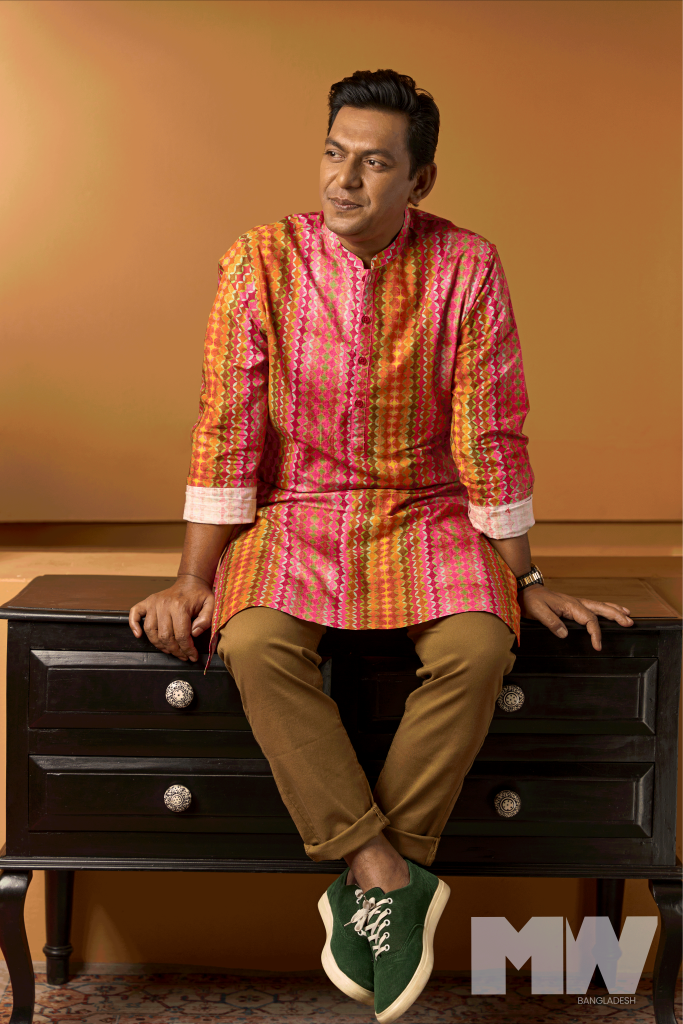
Do you ever feel like taking up a role behind the camera, perhaps as a director in the future?
No, it is a very difficult job. As an actor, I have witnessed how worthy a director needs to be for that job and I do not have the expertise nor the desire to become a director. Directing is complicated and direction requires knowledge of a horde of aspects surrounding the sector. The technical intricacies that directors need to know are a lot and our industry might have a long list of names under directors but the number of directors who actually know the work is very meager.
What or who were your heroes as a child? As in what kind of films/shows/books were you interested in?
There were not as many channels before I began acting. BTV was a predominant channel then and slowly several channels began to exist. I had the acting and writings of the big names then, to enjoy. I am not going to name names but the dramas and serials then would keep me anticipating the progress of the story. I would have to wait six days to watch the next episode for example and these dramas are still available on Youtube and they bring in the audience still. The popular actors from back in the day, awakened my interest to become an actor within me.
The size of your portfolio is overwhelming, to say the least. In this city of traffic, how do you manage your time to create a prolific portfolio?
Work locations are rarely arranged inside Dhaka as most of the time I am required to go to Uttara or the outskirts and I try to maintain the call time. We normally wrap work at around 9pm or 10pm when the roads become considerably free. I just have to manage the time for the sake of my profession. It is true that congestion takes away a lot of time out of our lives which could have been used productively but it does not become possible for us to attain as traffic is more or less a norm for us today.
What do you do to relax?
When I don’t have to work, I prefer to wake up late, pick up my son from school, and spend quality time with him. We normally stay home and occasionally we will go out to have dinner or snacks. It is also the time when I can watch movies, read books, and communicate with family members and friends. My work schedule can keep me from maintaining communications otherwise.
What is the best piece of advice you’ve ever received?
People have no constraints when it comes to greed, especially material. Not being able to reduce wants is a form of weakness for society. People can do with finding honest happiness in what little is necessary for living. The abundance of something can’t truly bring peace if people are unable to find peace in their hearts and minds.
Lastly, what is next for you?
I don’t have or keep a next. I usually end work with the sentiment of being done for now. The next will become obvious when I sign up for something but for now I haven’t signed on to any project yet. I usually take my time when selecting what project to work on so I am still in the middle of discussions. I don’t have a finalized commitment as of yet.




